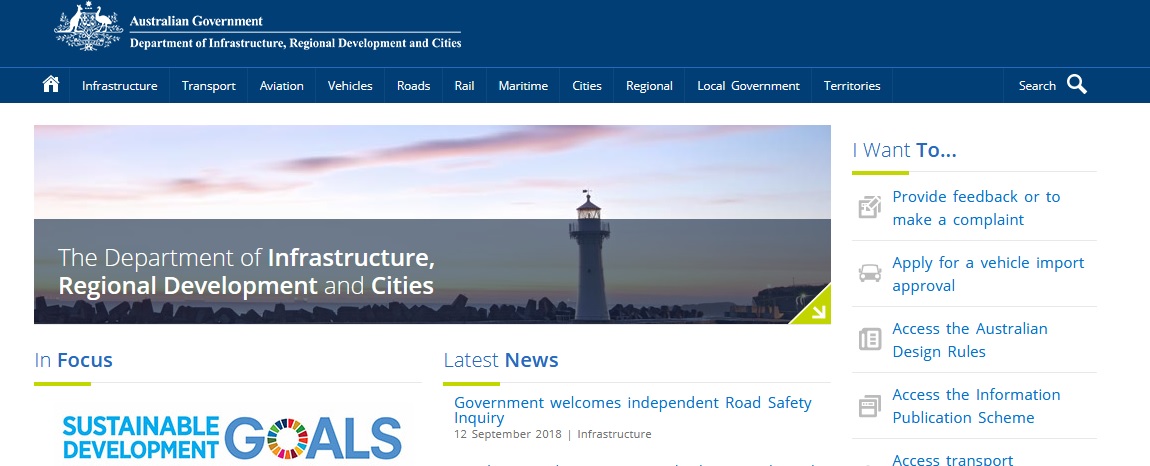Organization : Department of Infrastructure and Regional Development
Service Name : Federal Interstate Registration Scheme
Country: Australia
Website : https://www.infrastructure.gov.au/
Federal Interstate Registration Scheme
The Federal Interstate Registration Scheme (FIRS) is established under the Interstate Road Transport Act 1985 and commenced in 1987 as an alternative to state based registration for heavy vehicles weighing more than 4.5 tonnes.
Related : Department of Infrastructure & Regional Development SEVS Specialist & Enthusiast Vehicle Scheme Australia : www.statusin.org/11181.html
FIRS provides uniform charges and operating conditions for heavy vehicles engaged solely in the interstate carriage of passengers or goods, in trade or commerce, or for any purpose that is incidental to the carriage of that kind.


FIRS Heavy Vehicle Registration Charge:
The Council of Australian Government (COAG) and the Transport and Infrastructure Council (then the Australian Transport Council) agreed in February 2008 that heavy vehicle charges (including registration and fuel-based charges) should be adjusted annually to maintain full cost recovery of heavy vehicles’ share in road costs.
The National Transport Commission (NTC) is responsible for reviewing national heavy vehicle charges and calculating the annual adjustment. The NTC uses an economic formula as documented in the Model Heavy Vehicle Charges Act 2007 (as amended) and the Interstate Road Transport Charge Regulations 2009 to determine the annual adjustment factor. This formula takes into account changes in road expenditure and changes in heavy vehicle road use to determine the extent of the price changes.
On 1 July 2014 FIRS heavy vehicle registration charges increased by 1.3 per cent.
How to Register under FIRS:
State and Territory road transport authorities administer FIRS on behalf of the Australian Government. Operators wishing to register vehicles under FIRS apply to do so at the registration authority in their jurisdiction of residence.
Like state registration, vehicles must comply with relevant Australian Design Rules and other standard requirements in relation to vehicle construction, equipment and performance standards. FIRS vehicles must have compulsory third party insurance for the period of registration.
FIRS Applicability:
FIRS registration is available to heavy vehicles weighing over 4.5 tonnes, engaged solely in the interstate carriage of passengers or goods, in trade or commerce, or for any purpose that is incidental to the carriage of that kind. A FIRS registered vehicle may undertake an intrastate journey where it can be demonstrated, that the intrastate journey is for the carriage of goods as part of a larger interstate journey relating to those goods. Under these circumstances, the FIRS vehicle will be operating as per subsection 8(1) of the IRT Act, and will not need to be registered under a law of a State (paragraph 52(2)(a) of the IRT Act).
However, if the vehicle is undertaking the carriage of goods on an intrastate journey that is not part of a larger interstate journey relating to those goods, registration under the IRT Act will not remove the requirement for the vehicle to be registered under State law.
Determining whether a vehicle is carrying goods on an intrastate journey as part of a larger interstate journey is ultimately a question of fact. The following factors are relevant to making an assessment of whether the intrastate component of the journey is covered by the IRT Act:
** If a single transport company is contracted to carry out, or arrange, for the carriage of goods from a place in a State to a place in another State, it is likely that an intrastate journey component of the larger interstate journey will be covered by the IRT Act. This is the case even if the intrastate journey involves a leg being carried out by another FIRS vehicle or if a break in the journey to transfer the goods to another kind of vehicle (rail or ship etc) occurs.
** If there is a contract between a consignor in one State and a consignee in another State, this may point to the existence of an interstate freight journey that would be covered by the IRT Act.
** If a vehicle is carrying a load that involves an interstate journey, but on that interstate journey the vehicle also picks up goods that are transported as part of an intrastate journey, the vehicle will still likely be covered by the IRT Act.
** If the interstate journey for the transport of goods ends at one location in a State, it is unlikely that subsequent intrastate journeys from that point to another place within the State will be covered by the IRT Act.
Special Purpose Vehicles:
By nature of their definition, special purpose vehicles such as mobile cranes cannot be registered under FIRS. State/Territory permits are required for FIRS registered combinations operating as road trains and vehicles or combinations carrying large indivisible loads.